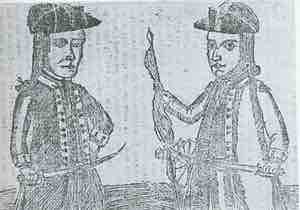Shays' Rebellion and the Revision of the Articles
Due to the post-revolution economic woes and agitated by inflation, many worried about social instability. This was especially true for those in Massachusetts. The legislature's response to the shaky economy was to put emphasis on maintaining a sound currency by paying off the state debt through levying massive taxes. The tax burden hit those with moderate incomes dramatically. The average farmer paid a third of their annual income to these taxes from 1780 to 1786. Those who couldn't pay had their property foreclosed and they were thrown into crowded prisons filled with other debtors.
In the summer of 1786, a Revolutionary War veteran named Daniel Shays began to organize western communities in Massachusetts to forcibly stop foreclosures by prohibiting the courts from holding their proceedings. Later that fall, Shays marched the newly formed "rebellion" into Springfield to stop the state supreme court from gathering . The state responded with troops sent to suppress the rebellion. After a failed attempt by the rebels to attack the Springfield arsenal, and the failure of other small skirmishes, the rebels retreated and then uprising collapsed.

Daniel Shays
Shays and colleague Job Shattuck
Shays retreated to Vermont by 1787. While Daniel Shays was in hiding, the government condemned him to death on the charge of treason. Shays pleaded for his life in a petition that was finally granted by John Hancock on June 17, 1788. Thomas Jefferson, who was serving as ambassador to France at the time, refused to be alarmed by Shays' Rebellion. In a letter to a friend, he argued that a little rebellion now and then is a good thing. "The tree of liberty must be refreshed from time to time with the blood of patriots and tyrants. It is its natural manure. "
In contrast to Jefferson's sentiments George Washington, who had been calling for constitutional reform for many years, wrote in a letter to Henry Lee, "You talk, my good sir, of employing influence to appease the present tumults in Massachusetts. I know not where that influence is to be found, or, if attainable, that it would be a proper remedy for the disorders. Influence is not government. Let us have a government by which our lives, liberties, and properties will be secured, or let us know the worst at once. "
At the time of the rebellion, the weaknesses of the federal government as constituted under the Articles of Confederation were apparent to many. A vigorous debate was going on throughout the states on the need for a stronger central government with Federalists arguing for the idea, and anti-Federalists opposing them. Historical opinion is divided on what sort of role the rebellion played in the formation and later ratification of the United States Constitution, although most scholars agree it played some role, at least temporarily drawing some anti-Federalists to the strong government side. By early 1785, many influential merchants and political leaders were already agreed that a stronger central government was needed.
Delegates from five states held a convention in Annapolis, Maryland in September 1786. They concluded that vigorous steps needed to be taken to reform the federal government, but it disbanded because of a lack of full representation. The delegates called for a convention consisting of all the states to be held in Philadelphia in May 1787. Historian Robert Feer notes that several prominent figures had hoped the convention would fail, requiring a larger-scale convention. French diplomat Louis-Guillaume Otto thought the convention was intentionally broken off early to achieve this end.
In early 1787 John Jay wrote that the rural disturbances and the inability of the central government to fund troops in response made "the inefficiency of the Federal government [become] more and more manifest. " Henry Knox observed that the uprising in Massachusetts clearly influenced local leaders who had previously opposed a strong federal government.
Historian David Szatmary writes that the timing of the rebellion "convinced the elites of sovereign states that the proposed gathering at Philadelphia must take place. " Some states, Massachusetts among them, delayed choosing delegates to the proposed convention partly because in some ways it resembled the "extra-legal" conventions organized by the protestors before the rebellion became violent.